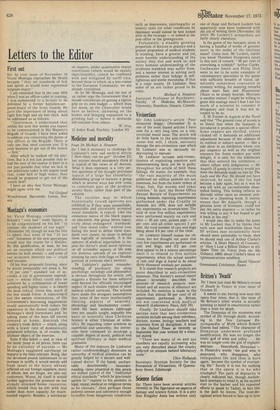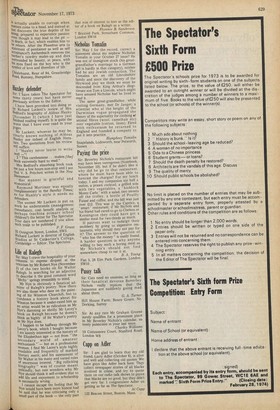Britten's 'Death'
Sir: 1 have just read Mr Milnes's review of Death in Venice in your issue of October 27.
It seems to me, having now seen this opera four times, that it, like most of Mr Britten's other works, is actually pointing to belief in resurrection rather than a wish for death.
The Dionysius of the mysteries was symbol of life through death. According to the New Larousse Encyclopaedia of Myth which Robert Graves had edited, "The character of Dionysius underwent profound modification. He was no longer the rustic god of wine and jollity . . . He was no longer even the god of orgiastic delirium . . . Henceforth, Dionysius — in Plutarch's words. ' the god who. is ,destroyed, who disappears, who relinquishes life and then is born again,' became the symbol of everlasting life." Surely it is not for nothing that in the opera it is he who triumphs? The path of depravity is clearly indicated but, though. Aschenbach attempts to tread it, in his second visit to the barber and his repeated efforts to speak to Tadzio, in fact this is the iiath he leaves. The over-disciplined writer forced to face up to love Is actually unable to corrupt when ratters come to a head, and instead at st discovers the true depths of his being; prepared to experience passion even though it may lead to the pit — ?0 death, in fact, which enables him to ee reborn. After the Phaedrus aria (a statement of penitamer as well as self cceptance?) Aschenbach removes the barber's tawdry make-up and dies surrounded by beauty, at peace, with Ns eyes fixed on the boy who is the sYntbol of love and therefore of life.
Chislehurst, Rear of 84, Greatbridge Romsey, Hampshire.



































 Previous page
Previous page